Elders connect, teach and heal through Noongar language book - ‘Kala’
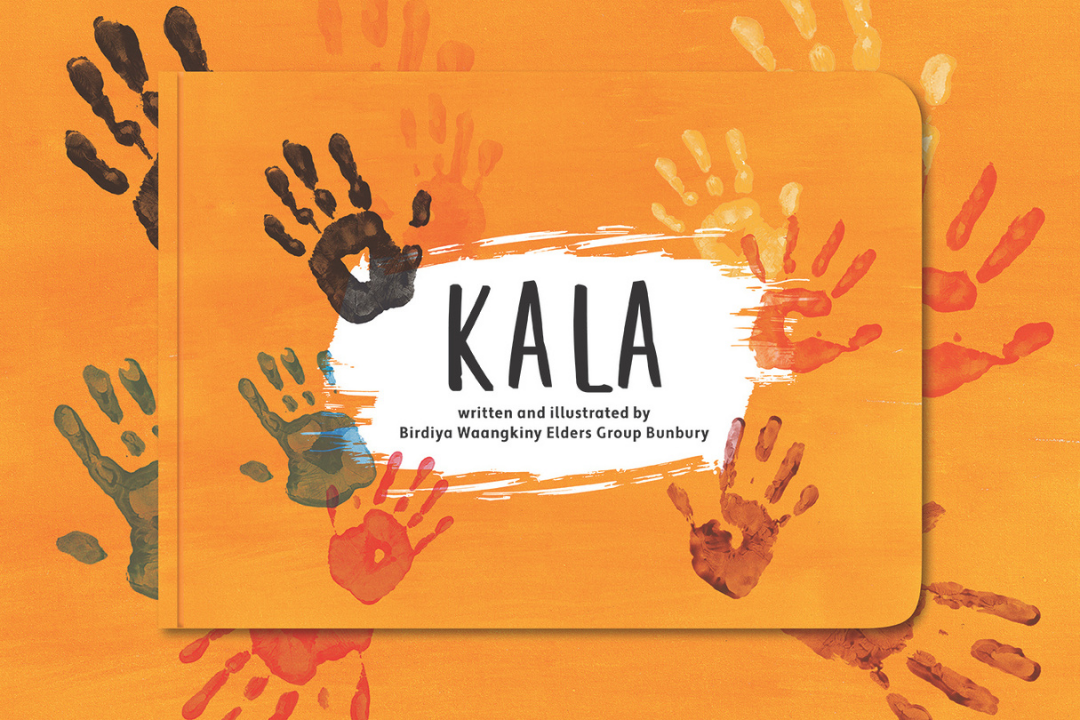
Kala is a new title written and illustrated by a group of Elders and Community members from Birdiya Waangkiny Elders Group in Bunbury, Western Australia, and published by the Indigenous Literacy Foundation (ILF).
The authors and illustrators include Charmaine Councillor, Roslyn Khan, Gloria Dann, Phyllis Bennell, Teryle Collard, Sandra Nebro, Joanne Ugle and Marjorie Ugle.

ILF Communications Manager, Ella, sat down to have a yarn with creators Charmaine and Roslyn to ask about the impact of this book on their Community.
“Could you tell me some of the background behind this book, how it was created, and why you wanted to create it?” asked Ella.
“Wardandi Miya-k Kaadadjiny Aboriginal Corporation is a Noongar language hub based in southwest of Western Australia, in Bunbury” explained Charmaine.
“This book was an opportunity that came up when I attended the PULiiMA conference in Darwin 2023 and met Josie Lardy (ILF’s Regional Coordinator) from the ILF.
I had a talk with her, and I said, well this is fantastic - this is something that maybe our Community might be able to do. The following year, we applied and got approved, and we were quite excited.
We then invited Josie to our language hub that we’ve had set up for a little while. Josie introduced herself, did a presentation about what the ILF does, and how ILF helps Community with literacy and getting it out to our Community. From there, it just blossomed.”

Ella asked “What impact do you think this book has had and will have in your Community, and potentially other Noongar speaking Communities?”
“Well, I know that my sister, she's excited about it,” said Roslyn.
“She's gone online and ordered a book. So that's one of the impacts. My other children, they’re like really happy to hear that this book is out, and I think putting it in schools, and just the recognition of the Noongar language and reviving it. Even through the Elders group, our first book, that's a big thing. People are surprised to hear that that's happened and for our book to actually be written.”
“I can see the impact it has on Roslyn herself, as a mum, a grandmother, cousin, sister, auntie,” Charmaine added. “Her engagement in the project itself has a big impact on our Community. She is a quiet achiever. She can be sometimes unaware of how much potential and language experience she has. I think it's also enabled her to grow.
“I can also see the impact on the Elders. We have one Elder that hadn't had any language growing up and was forbidden to speak language, and she expressed how beautiful that she can speak her language again. She said how it has helped her to become a Noongar woman, know her Noongar language, and it connects her to her Country. And she felt empowered through this.” said Charmaine.
“There is also Gloria Dann, who was a language teacher from 20-30 years ago. Gloria was our first Noongar language teacher in the Community of Bunbury. She worked at a local Aboriginal school called Djidi Djidi Aboriginal School.

Gloria set the precedent for language for us.
She is the matriarch who fought for language and has now passed that on to the next generation.
Now she's retired, she's sitting back in a language hub with us. This is a legacy piece back to her former students and her family - it’s just mind blowing, because we know Elders are very special to us. They hold knowledge and culture, and particularly this Elder, Gloria. It's her way of giving back, but it's also a way of us honoring her.
Also for my mum, who is a singer-songwriter. She is writing a book about her granddaughter and connecting with her. So it's intergenerational learning. And so she was also working with our group for many, many years, and she started reviving her language for herself, for healing, so it's her way of finding out her identity and who she is. There are just so many layers to it.
Everyone in this little group has some sort of purpose why they are here. And when we started this project - it gave us even more purpose and excitement, because they can come collectively together. It doesn't matter what background or what they've experienced and what level of language they are at. It made us all have a common desire and a common goal. Producing that book put us all on a level playing field with each other. We were a team.
And it's so beautiful - the book. We were just so excited that someone wanted to publish a book for us. Now our kids are going to benefit from it. The language survival and maintenance of our Country is amazing. And I think our hub provided a place for Elders to meet in a safe space, to do that without any judgment, any fear,” explained Charmaine.
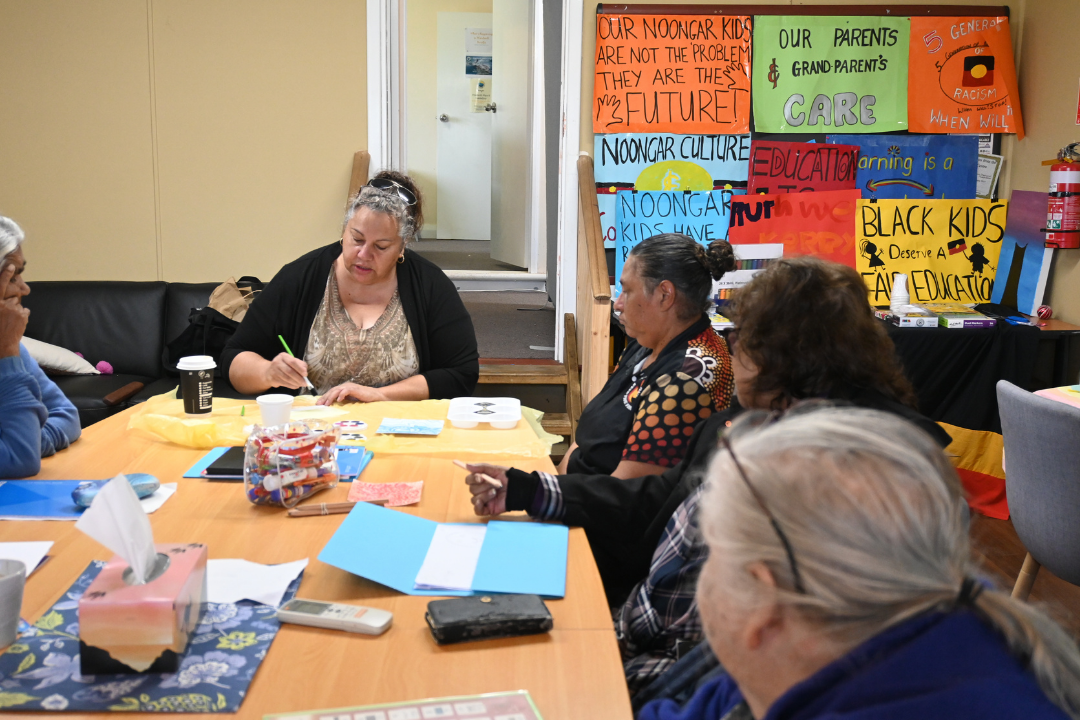
Roslyn expanded that “I think when they first started - that trauma was there. But the group is starting to open up. And even with myself, like us younger generation. We didn't learn it much from our parents, so it kind of opened up language for me as well as the Elders.”
Ella asked “I know you have a couple other projects in the works; Roslyn you're working on your own individual book at the moment. Do you think that these projects are helping you with your language work? Or do you think that the books are a result of your growth in your language work?”
Roslyn said, “For me, I think it's both. Being strong in our language.”
“I think I agree with Roslyn, it’s both,” said Charmaine.
“Working on this book gives us a desire to keep moving.
Having a goal or a purpose to learn language is very important because we have been operating for some time, but sometimes it can be a bit stagnant. When you have new people rotating all the time in language class, you have to go back to the beginning. It can limit people's learning.
Working on Kala gave people a purpose to keep coming. It was like an initiative to say, ‘Come on, we get to class because we've got this goal we’ve got to work towards. We’ve got to publish this.’"
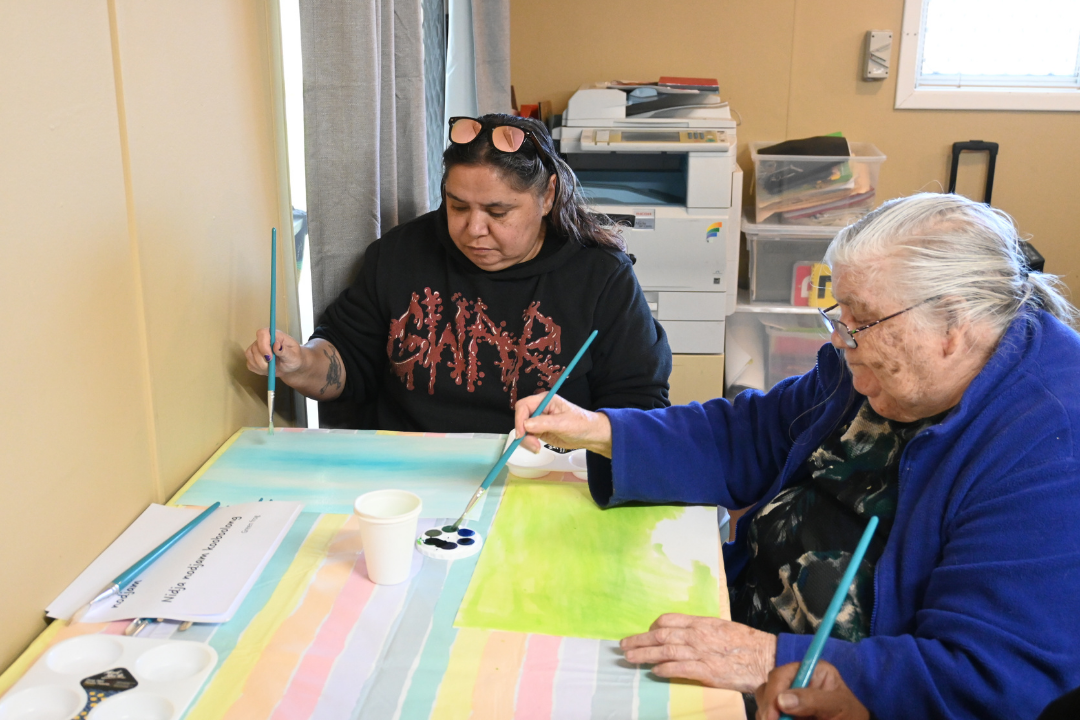
Charmaine continues, “It was a really nice outcome for this group, because it gives them the purpose to learn.
I think the strength is people are excited about their own journey in language.
It's also that social network as well. Some Elders live by themselves, or don't have that social connection with others in the Community. And to learn Noongar on top of it, share stories and yarns about when they might have heard a word. I agree with Roslyn again because it’s a result of all that commitment that's put together. But I think without that commitment, you couldn't have the book. It's hand in hand.
In saying that, I was just excited that we got picked to be part of the project and I knew it would be my way to entice the group to keep coming back consistently.
One of the ladies in particular, after working on this book she has signed up for another art project. And people in the Community are keen to be involved in our programs.
It just took a fear away from people learning how to publish and write. But [ILF’s Regional Coordinator] Josie and [ILF’s Publishing Editor] Sam have done a wonderful job. And we got lots more coming yet. Each individual is going to write their own book now.”
“Can you tell me a little bit about what you're planning?” asked Ella.
“At first,” responded Charmaine, “we were a bit intimidated by the process. So we decided to do a book together.
Our next plan is that each person can do their own individual book now they've experienced a collective project and has confidence.”
Roslyn is working on her book which is about her family. It’s dedicated to and illustrated by her daughter.
Ella asked “Can you tell me a little bit about how you kind of got more confidence in illustrating and ended up with these beautiful artworks that feature?”
“We didn't know how to start at first so we got an artist that was referred to us by ILF. Her name was Pauline Bonnie, and she took all of the hard thinking away,” explained Charmaine.
“She led us through small stages, which was really good to cope with. One day another backwash, if you're not confident with drawing, let’s find some shapes of animals you can do. She showed us some samples that she did, tracing a picture of an animal, colouring it in, but doing techniques and designs that people feel comfortable with.
Pauline made us feel comfortable, and we all learnt together.
We all chose the colours and thought about, oh, what animal or plant or object would represent that colour.
So we've done a lot of looking at photos, researching, looking at the birds and the animals of our Community, what colour they may represent.
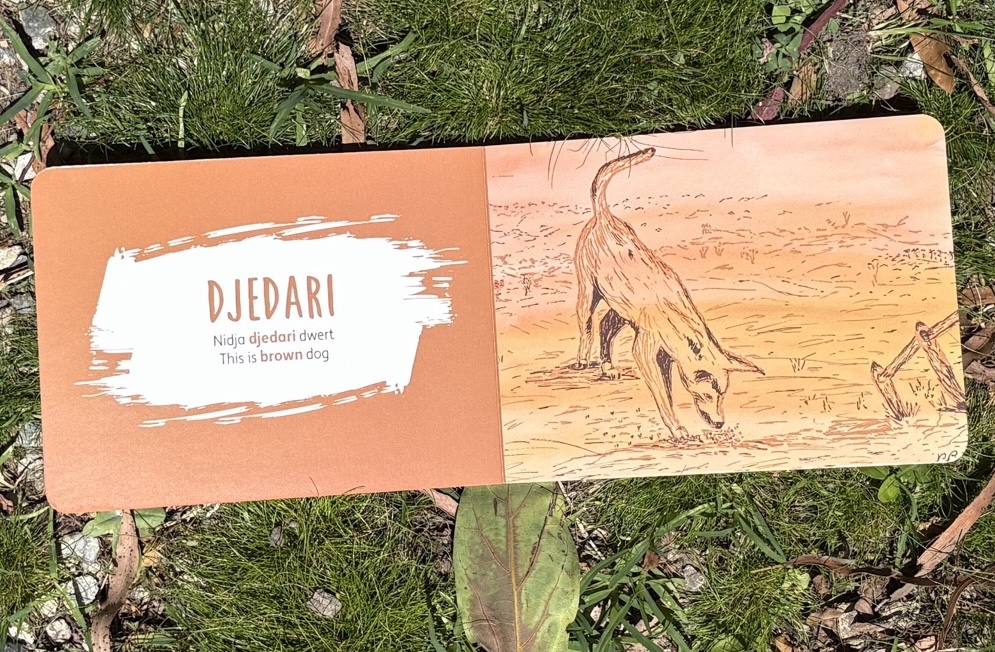
Working this way with Pauline stripped back all the fear and all the stress. It just eased everything and gave us a level playing field where we could work together and support each other and look at colours and simple techniques that really were effective for all of us,” said Charmaine.
Ella asked Charmaine and Roslyn “You talked a lot about how past policies meant that people weren't allowed to speak their language. What is the impact of being able to learn or relearn language that was forbidden in the past?”
Charmaine replied,“I've worked with Elders in many projects over the last 20 years, and to see the relief and the release of emotion, because sometimes they are waiting for someone to tell them they can speak language again. They're seeking that permission, and they don't know how to go about it.
It’s like giving them permission or giving them the space to rethink, ‘Can I speak my language again without fear or someone asking me why I am doing that now and why would you go there?’
And it's not purely about the language alone, it's also about their identity. It's about them connecting to who they are. Because when they start speaking their language, it's actually the language of the land that they were born on, or maybe taken from. Sadly, a lot of our people experience this, the mechanism of Stolen Generation. They were taken off Country and forced to learn another language, or another way of life. And when they want to go back to Country, speaking their language can actually help them heal and connect,” said Charmaine.
She continued, “Sometimes I've seen examples where people feel like they've given them permission to reclaim their language and reclaim their Country, and sometimes it helps with memories that they may have heard their Elders or their families speaking language when they're a child and reconnecting.

There are often lots of tears, lots of anger coming through that as well - and trauma surfaces. A person taken away might have heard their last language when they were taken away.
I've experienced working with many older facilitators that have mixed emotions, and so it does have a big impact. I can honestly speak for the Elders that I’m working with today - to say that healing is starting to happen and identity is strengthening. These Elders are feeling proud.
And some want to share it out in the Community, loud and proud. Others just hold it dear in their heart and it’s a personal experience they chose to keep for themselves, and that is fine. Getting them to be open and not ashamed is the goal.
They're saying the word for Hello - Kaya. If you say one word in language for the rest of your life, you’re speaking your language. If you say one or two words in Noongar the rest of your life, that is speaking your language. And some people say, ‘Why bother?’ And I say, ‘Why not?’”
And it's a word that you never spoke before. It's just reclaiming their identity, their language, their Mother Tongue. I can see it in their faces and expressions and laughter.
Charmaine continued,“This process also puts the Elders back as our stewardesses, our hierarchy system - where Elders have the knowledge.
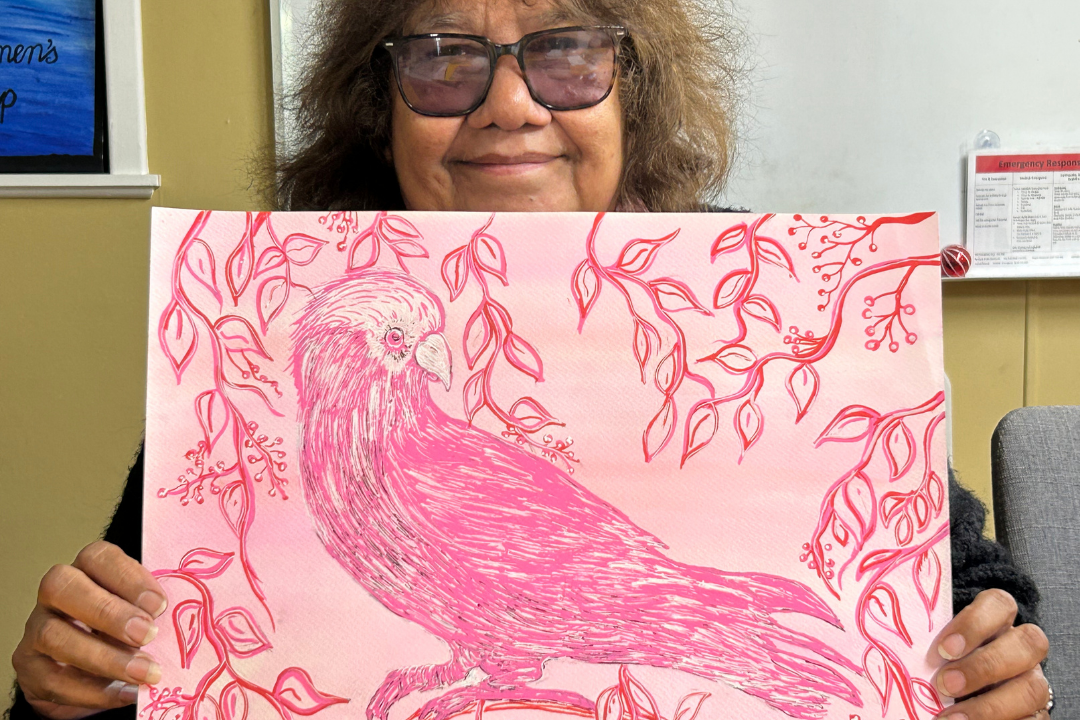
It gives our Elders a place of prominence back in our Community as well. So the younger generation can see these Elders put out a book - wow.
Kids would go, ‘That's my Nan, that's my Auntie, that's my great grandmother, or great grandfather.’ It makes kids feel proud – ‘Oh, I didn't know my Nan knew that,’" explained Charmaine.
“And for me,” said Roslyn, “I think I could speak for everyone too, connecting to your culture, to your language, that's the biggest thing. And I'm just very grateful to Charmaine for being a mentor and an inspiration for me, so for my family as well, they're seeing a different side of me now and learning that I'm wanting to know where I come from, that was my biggest thing in my life. I didn't know where I belonged. So I think engaging in this language hub and this book - it's brought me full circle with culture still ongoing, learning, but glad to be part of this group.”


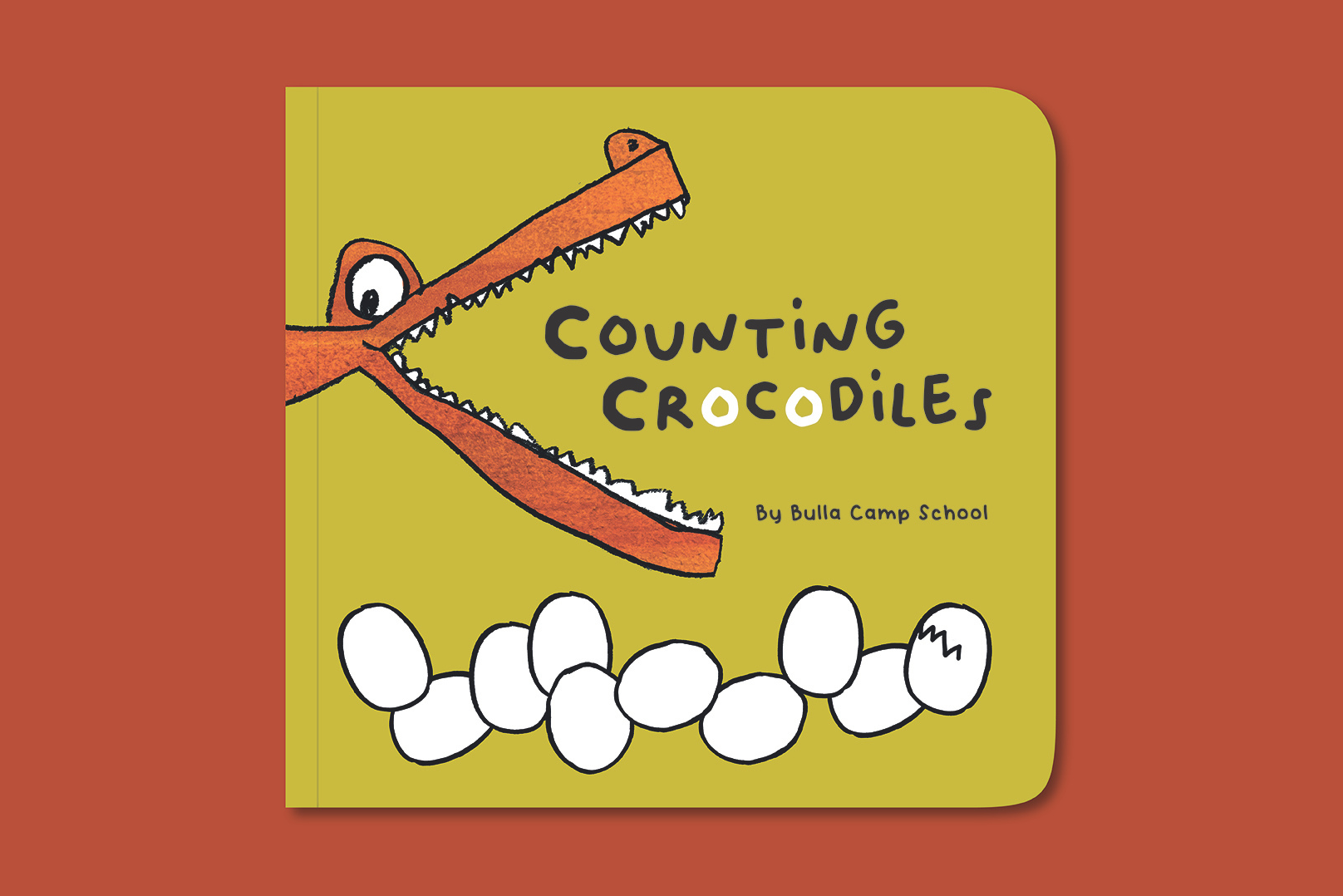
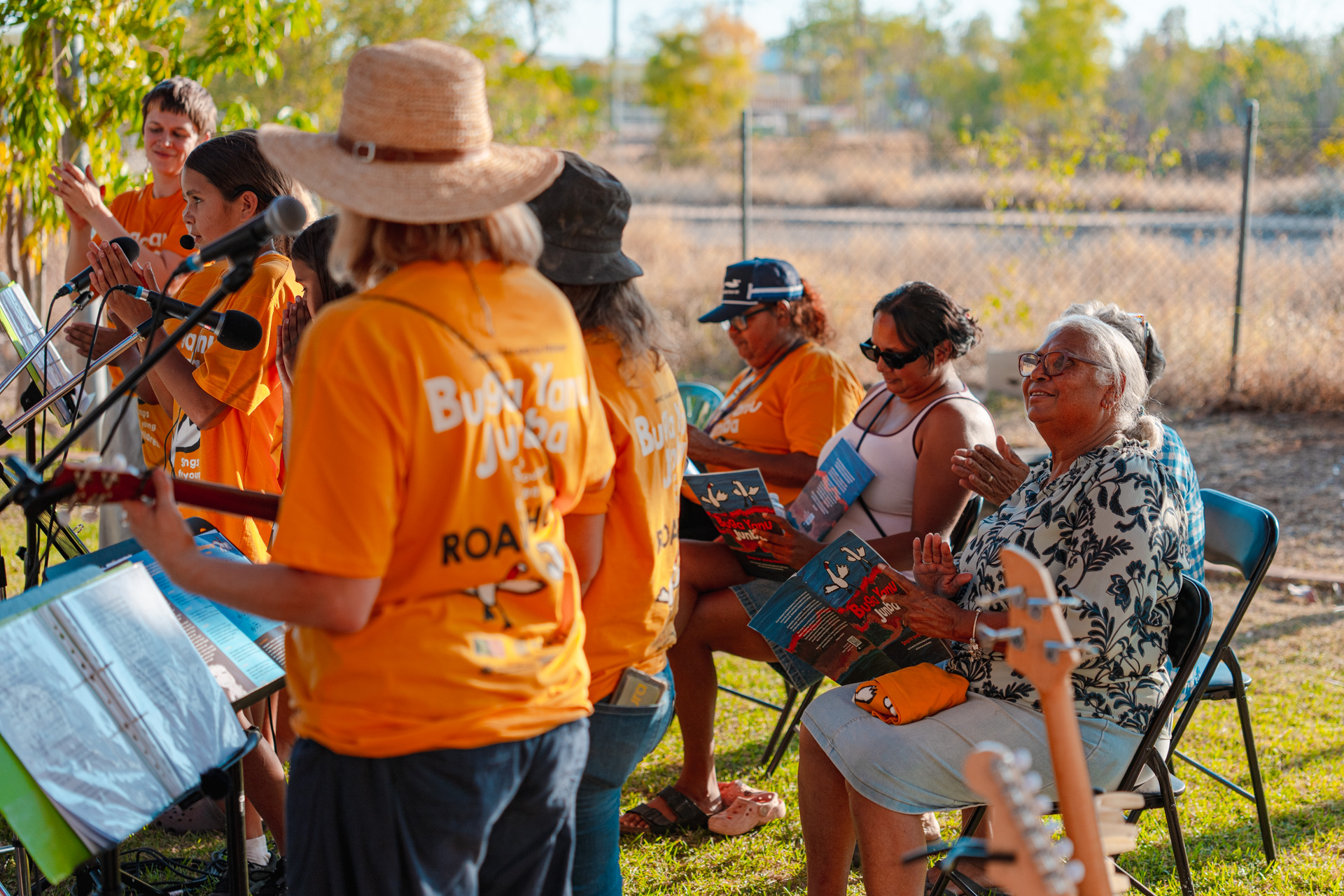
.png)
